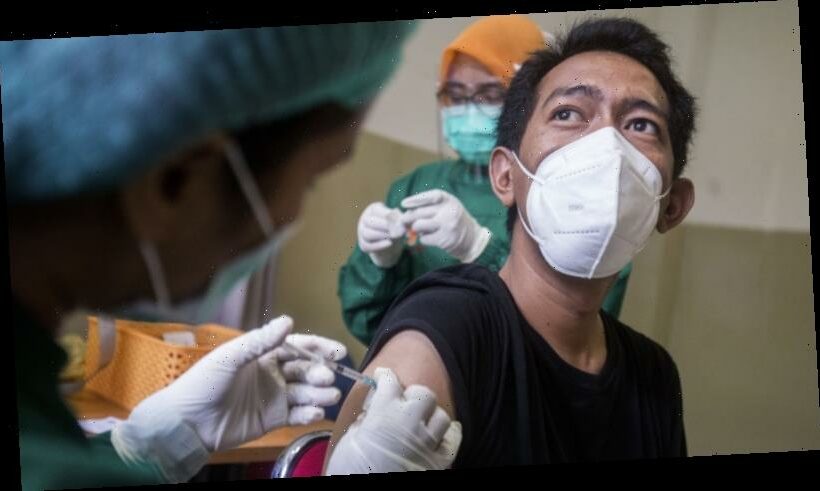“With every day that passes, the divide grows larger between the world’s haves and have nots.” This is usually a lament about increasing wealth disparity, but the World Health Organisation’s Director-General, who made the comments this week in Geneva, had more immediate concerns.
Tedros Adhanom Ghebreyesus was echoing unease among many global health advocates about “vaccine nationalism”, the increasingly lopsided distribution of vaccines in favour of a select group of countries. While wealthy nations have secured billions of doses of COVID-19 vaccines, many other countries are struggling to buy anywhere near enough to inoculate their people.
A nurse gives a shot of a COVID-19 vaccine at a hospital in Indonesia. Credit:AP
That is not going to change any time soon. This week the Biden administration, which is desperately trying to speed up vaccinations, announced it was committed to buying another 200 million doses of the two vaccines (Pfizer and Moderna) that have been authorised for emergency use in the United States.
And in Europe, where vaccine deliveries from Pfizer and AstraZeneca are falling short, officials are considering export restrictions on doses produced within its borders. Under the EU’s new “transparency” system, all vaccine producers will effectively have to ask for permission before vials can be sent outside the region – a requirement that will at the least slow the distribution process to some countries, including Australia.
While the hoarding of vaccine stocks in Europe and America has been exacerbated by faltering supplies, there is also increasing pressure on these nations to contain the COVID-19 second wave that has resulted in a mounting death toll and new social-distancing restrictions.
Such vaccine hoarding will have a global impact. Most analysis is putting the financial cost to the global economy in the trillions of dollars, with trade routes and international travel having to be restricted until the virus is contained worldwide.
The most effective mechanism in place to counter the hoarding is COVAX, a global collaboration of more than 180 countries run by the WHO and the GAVI vaccine alliance. It has agreements in place to access over 2 billion doses of vaccines either already approved or ones that will hopefully prove effective in the future. Australia has committed more than $120 million through COVAX to buy enough doses to vaccinate half of our population, while another $80 million has been committed to assisting less wealthy nations get enough supply.
In a promising sign, while former US president Donald Trump refused to support COVAX, President Joe Biden’s chief medical adviser, Anthony Fauci, has told the World Health Organisation that the US intends to back the program.
Probably the biggest impediment though to broader supplies of vaccine is the refusal by pharmaceutical companies with proven vaccines to drop their intellectual property protections. In October, India and South Africa asked the World Trade Organisation to temporarily waive the protections so that vaccines and equipment for fighting COVID-19 could be made more cheaply at greater scale. Australia joined Britain, the US and the EU in opposing the move, arguing that existing licensing rules would be sufficient to meet demand.
As wealthy nations, including Australia, continue to amass enough vaccine supplies to protect their own populations, it is becoming clear that demand for doses of vaccine in the foreseeable future is going to far outstrip supply with such restrictive measures in place. A more altruistic approach would not only benefit those nations struggling to protect their people from the virus. Containing the virus more broadly around the world would prove beneficial to every nation.
Note from the Editor
The Age’s editor, Gay Alcorn, writes an exclusive newsletter for subscribers on the week’s most important stories and issues. Sign up here to receive it every Friday.
Most Viewed in National
Source: Read Full Article

